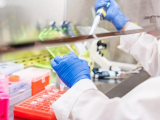Jan 28, 2009 (CIDRAP News) The US Food and Drug Administration (FDA) today released its inspection findings on the Georgia peanut butter plant that has been linked to a nationwide Salmonella outbreak, saying the company shipped products that had initially tested positive for Salmonella and citing various other questionable practices.
Michael Rogers, who directs the FDA's field investigation division, told reporters at a press conference yesterday that FDA investigators found that the Peanut Corporation of America (PCA) plant in Blakely, Ga., detected Salmonella in some of the products it made in 2007 and 2008, but later released them after testing by an outside firm found no contamination in the products.
It was unclear, however, what type of testing was initially done and what the chances were of the tests producing false-positive results. The earliest case mentioned in the FDA's report was in June 2007.
Also today, FDA officials announced that PCA is expanding its recall to cover all products produced at the plant since Jan 1, 2007.
"There is concern of potential Salmonella contamination, including Salmonella strains not associated with the current outbreak," Dr. Stephen Sundlof of the FDA said at a late afternoon news briefing. But he said the agency has not yet seen any illnesses involving strains other than the outbreak strain, Salmonella Typhimiurium.
Given the expanded PCA recall, the FDA expects that food companies will check their supply chains to determine if they have products on the market containing ingredients covered by the expanded recall, Sundlof said. He advised consumers to check the FDA's Web site to see which products have been recalled and said if they are unsure whether a peanut-containing product is potentially contaminated, they should avoid eating it or feeding it to pets.
The FDA released its full investigative report on the PCA plant, called form 483, today on its Web site. The report includes a list of observations that Rogers classified as deviations from Good Manufacturing Practices, some of which he said are violations of the federal Food, Drug, and Cosmetic Act.
The report says the FDA identified 12 instances in which peanut products tested positive for Salmonella on internal testing between June 2007 and September 2008, but the company then released the products after further testing was negative. Initial testing found Salmonella Typhimurium once, Salmonella Anatum twice, and unspecified strains nine times.
John Besser, PhD, clinical laboratory manager at the Minnesota Department of Health, reviewed the FDA's investigation report and told CIDRAP News that the company used screening tests in the instances where it detected an unidentified Salmonella serotype and used confirmatory testing methods in the three instances where it identified a serotype.
He said there was not enough information to tell if there was a problem with the confirmatory tests or if the company had inadequate testing procedures. "No matter how you cut it, there was some type of negligence," Besser said.
The identification of specific Salmonella serotypes should have told the company that there was a problem either with the testing or with the peanuts, he said.
Screening tests take about a day, while confirmatory tests take from 3 to 5 days, Besser said.
Clarification needed on test methods
Michael T. Osterholm, PhD, MPH, director of the University of Minnesota Center for Infectious Disease Research and Policy, publisher of CIDRAP News, said that despite dramatic headlines about the PCA releasing products that tested positive for Salmonella, more information is needed about methods the company used in its initial product testing.
FDA officials told CIDRAP News that an independent private laboratory conducted PCA's initial testing, but that the FDA didn't have any information on the testing methods used.
Osterholm said there was no question that the FDA found Salmonella in the PCA plant. But he said detailed information about the initial tests the company used could help clarify what went wrong and that public health officials need to know if those tests produced true-positive Salmonella findings. That would help clarify whether the company released products it knew might be contaminated, he said.
"The lack of clarity with regards to these tests really points to a lack of credible information for the entire investigation," he said. "It's hard to make decisions if the information is piecemeal or potentially incorrect."
At today's briefing, the FDA's Rogers said the agency is aware of the labs used by PCA for its internal testing and has no information suggesting problems with the labs or their test results. However, he said that unless there are mitigating circumstances, the practice of releasing a product after first getting a positive test result and then a negative result is not common in the industry and "is certainly a deviation from current Good Manufacturing Practices."
Rogers also commented that it "is sometimes possible to get negative and positive results from the same product lot."
Cleaning deficit, storage errors
The FDA report also said the company did not clean the peanut paste production line after Salmonella Typhimurium was found in the paste on Sep 26, 2008. The report said the company did not clean the line until the FDA began inspecting the plant on Jan 9.
Although the firm recognized that the roasting step was the key to eliminating contamination in raw peanuts, it didn't verify that the temperature, volume, and belt speed of its roaster were adequate to kill pathogenic bacteria, the report said, adding that temperature documentation was incomplete for several time periods.
FDA officials observed several instances in which finished products were vulnerable to contamination, including:
- Storage of raw peanuts next to roasted peanuts; sometimes the raw and finished products were visually indistinguishable
- Storage of finished products within 15 feet of a floor crack where investigators isolated Salmonella Senftenberg
- Placement of pallets of finished product within 3 feet of a cooler floor where authorities isolated Salmonella Mdbandaka
Also, FDA investigators found mold on the ceiling and walls of the finished product cooler, along with water stains running down from the cooler's fans, located directly above where the finished products were stored. Also, finished products were stored beneath skylights and ceilings that showed evidence of rainwater leakage.
The report said the facility lacked a ventilation system to prevent potential contamination from airflow from the areas that handled raw peanuts to the finished product areas. Also, some areas of the plant lacked segregation between raw and finished products.
Other findings included product residue buildup on and near production equipment, dirt and grime on washroom equipment and walls, and evidence of roaches in a washroom adjacent to the production and packaging areas.
Other developments
Sundlof, director of the FDA's Center for Food Safety and Applied Nutrition, told reporters yesterday that though investigators have wrapped up their investigation at the plant, the FDA, along with state officials, has visited about 1,000 food manufacturers that used potentially contaminated peanut butter and peanut paste in their products and was still testing products and reviewing distribution records. He said he expects the list of recalled products to expand.
At today's briefing, Robert Tauxe, MD, MPH, deputy director of the Center for Disease Control and Prevention (CDC) Division of Foodborne, Bacterial, and Mycotic Diseases, said the case count in the outbreak remained at 501 in 43 states, plus one case in Canada. He said the outbreak appears to be ongoing, though the number of new cases has modestly decreased.
Half of the cases have occurred in children younger than 16, Tauxe reported. He said 108 people have been hospitalized, and eight deaths may be associated with the outbreak, all of them in people older than 59.
In other comments at today's briefing, Sundlof said the FDA still sees no evidence of any contamination in national name-brand peanut butter. He said national brand manufacturers have assured the agency that they never bought any peanut products from PCA.
Tauxe noted that people with no Internet access can call the CDC hotline at 1-800-232-4636 for information on product recalls.
In a statement yesterday, the American Peanut Council expressed shock that PCA "knowingly released a product with potential salmonella contamination into the food supply, as released by the Food and Drug Administration."
"The findings of the FDA report can only be seen as a clear and unconscionable action of one irresponsible manufacturer, which stands alone in an industry that strives to follow the most stringent food safety standards," said Patrick Archer, president of the trade association.
See also:
FDA outbreak page
http://www.fda.gov/oc/opacom/hottopics/salmonellatyph.html#news
American Peanut Council statement
http://admin.peanutsusa.com/documents/Document_Library/FDA%20Report%20Reaction%20-%201%2027%2009%20FINAL.pdf


















